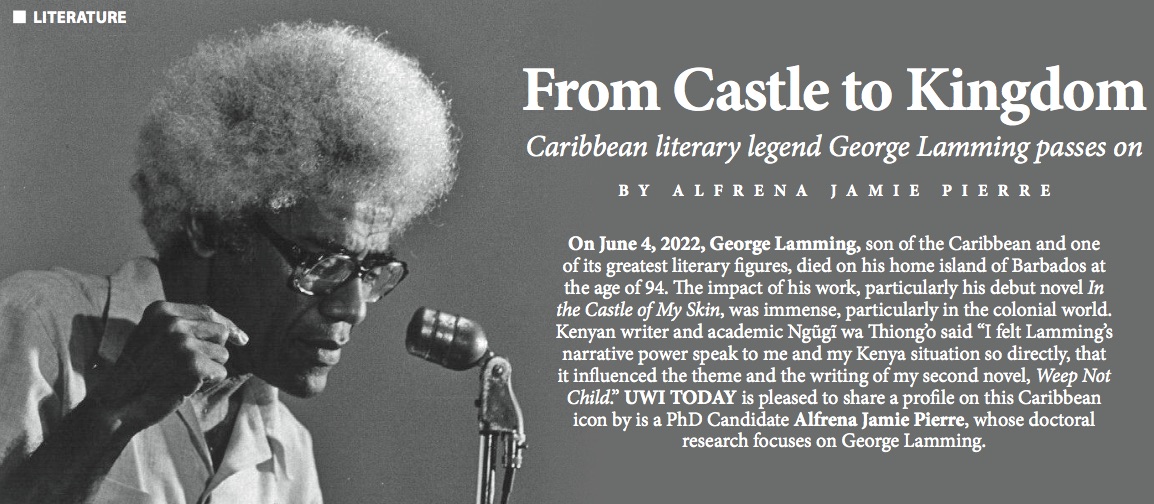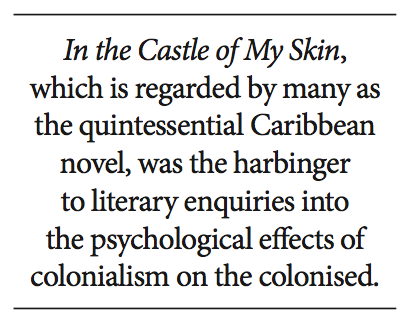
George William Lamming was born on the eighth day of June 1927 in Carrington Village, Barbados. He was the child of a Black Barbadian mother and a White English father. While Lamming’s mother fulfilled a principal role in his life, his relationship with his biological father was estranged. This severance from his father, perhaps, was the psychological source from which Lamming coined the phrase “my mother who fathered me”.
Lamming’s childhood home was defined by a strong Christian ethos and an acute consciousness of the socio-economic potentiality which a formal education possessed. Lamming was a notably intelligent child. He attended Roebuck’s Boys School and then won a scholarship to Combermere High School.
In 1946, Lamming immigrated to Trinidad from Barbados to be an English teacher at El Colegio de Venezuela, a boarding school for Latin American boys, adolescent males and young men aged seven to 20 years old. In 1950, He would depart Trinidad for England, fortuitously, aboard the same vessel as renowned Trinidadian literary artist, Samuel Selvon.

In 1953, when Lamming was just a young immigrant in England in his 20s, he wrote and published his first novel, In the Castle of My Skin. In the Castle of My Skin, which is regarded by many as the quintessential Caribbean novel, was the harbinger to literary enquiries into the psychological effects of colonialism on the colonised. His second novel, The Emigrants (1954), considers the Caribbean New World individual in transit to England as “mother country”. Of Age and Innocence (1958) prophetically extrapolates a tripartite governmental system to a Caribbean New World with enormous consequences for the society. These novels, along with those of Selvon, VS Naipaul and Andrew Salkey, were instrumental to the formation of the Anglophone Caribbean literary canon in the 1950s.
Subsequently, Lamming would publish Season of Adventure (1960), a work which employs a female protagonist to explore different ways of being for Caribbean peoples in the outworking of their own identity. Water with Berries (1971) engages William Shakespeare’s 1623 work, The Tempest, to unearth the complexities in the relationship between the British colonial mother and the colonised; and Natives of My Person (1972) extensively probes the reality of the European coloniser, showing the reader that our understanding of self is linked to our understanding of those who colonised us. All of Lamming’s novels treat with facets of the colonial experience.
His six esteemed novels, along with his cleverly written poems, such as “Swans”, “Image”, “Recollection”, “Birthday Poem for Clifford Sealy”, “February 1949”, “The Sculptor”, and his artful short stories, such as “A Wedding in Spring”, “Of Thorns and Thistles”, “Birds of a Feather” and “Birthday Weather” – which were all published throughout the 1940s to 1970s – established Lamming as a consummate literary talent in the Caribbean, England, France, Africa, Canada, the United States of America, and the rest of the world. The sustainability of his work and its contribution to Caribbean and postcolonial letters are irrefutable.
This acclaimed Caribbean writer has received numerous accolades. In 1958, Lamming received the Somerset Maugham Prize for literature; in 1980, he was conferred an Honorary Doctor of Letters from The University of the West Indies. In 2011, the Association of Cuban Writers and Artists bestowed him with the Caribbean Hibiscus Prize for his lifetime contribution to the arts as the first beneficiary of this award. In 2013, he received the Clement Payne Appreciation Award. In 2014, he was awarded the Anisfield-Wolf Book Lifetime Achievement Award for his work.
Lamming was also a perspicacious and prolific Caribbean thinker. His writing has been, and continues to be, valuable to Caribbean intellectual thought, as it probes notions of identity in the aftermath of the region’s colonial past. Noted Lamming scholar Sandra Pouchet Paquet in Twentieth-Century Caribbean and Black African Writers wrote of Lamming, “His work is seminal. He is foremost among those Caribbean writers who first articulated the symbolic systems that make up modern Caribbean writing. In each of his novels and his collection of essays... Lamming conceptualises core facets of the Caribbean experience in language and forms that continue to exercise a shaping influence over the literature of the region.”
The Barbadian novelist produced a plethora of pioneering essays which significantly expanded academic resources on Caribbean poetics. His noted essays include “The Pleasures of Exile’s” (1960), “The Indian Presence as a Caribbean Reality” (1989), “The Negro Writer and his World” (1956) and “The Sovereignty of the Imagination” (2004). The latter was delivered at Caribbean Reasonings: The Sovereignty of the Imagination: The Writings and Thought of George Lamming, a special conference hosted The UWI Mona Campus in his honour in 2003.
His insightful essays and lectures are contained in compilations such as Conversations: George Lamming: Essays, Addresses and Interviews 1953-1990 (1992), a collaborative work of Richard Drayton, Andaiye and the author himself, as well as The George Lamming Reader: The Aesthetics of Decolonisation (2011), an Anthony Bogues edited text. Lamming also independently published his scholastic essays, like Coming, Coming Home: Conversations II: Western Education and the Caribbean Intellectual Coming, Coming, Coming Home (1995) and Sovereignty of the Imagination: Conversations III: Sovereignty of the Imagination: Language and the Politics of Ethnicity (2009).
The UWI has had a long relationship with George Lamming. In 1967, he was Writer-in-Residence at The UWI Mona campus. In 1980, 1983 and 2009, Lamming delivered his formative lectures, “Politics and Culture”, “The Plantation Mongrel” and “Caribbean Thought: History, Pedagogy and Archive” at The Cave Hill campus. In 2011, he was a guest lecturer at UWI St Augustine’s Department of Creative and Festival Arts’ 25th anniversary celebration. In 2009, The UWI renamed the Pedagogical Centre of the Errol Barrow Centre for the Creative Imagination at Cave Hill to the George Lamming Pedagogical Centre his honour. Additionally, the George Lamming Distinguished Lecture is hosted annually, and the George Lamming Collection is currently housed at the Sidney Martin Library’s West Indiana Collection ̶ Special Collections at the Cave Hill campus.
George Lamming died on Saturday, June 4 in his native Barbados, four days shy of his 95th birthday. He was a literary genius and a profound Caribbean intellect who will be greatly missed.